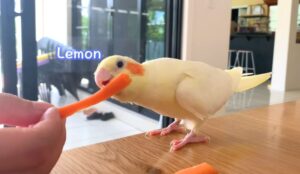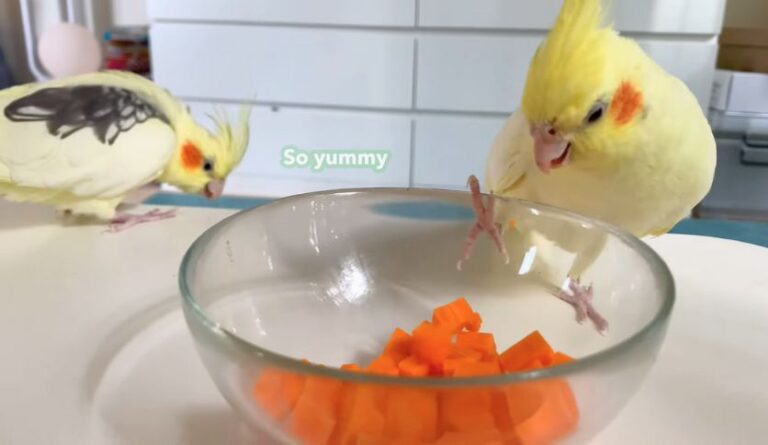Cockatiels can eat carrots as a part of their diet. Carrots provide them with essential vitamins and nutrients.
Cockatiels, also known as small parrots or mini cockatoos, are beloved pets known for their playful and friendly nature. As an owner, it’s crucial to provide them with a well-balanced diet that includes a variety of fruits and vegetables. One such vegetable that you may be curious about is carrots.
Fortunately, cockatiels can eat carrots and benefit from their high nutritional value. Carrots are excellent sources of vitamins A, B, C, and K and minerals like potassium and fiber. Including carrots in your cockatiel’s diet can improve their health and well-being. However, it’s essential to remember that carrots should be given in moderation and within a balanced diet to ensure your cockatiel receives all the necessary nutrients.
Benefits Of Carrots For Cockatiels
Carrots are not only tasty for humans but also offer a range of nutritional benefits for cockatiels. These vibrant orange vegetables are packed with important vitamins and minerals that can contribute to a healthy diet for your feathered friend.
Carrots are a good source of beta-carotene, which the body converts into vitamin A. This vitamin is essential for maintaining good vision, supporting the immune system, and promoting healthy cockatiel growth. Additionally, carrots contain antioxidants that help protect the body’s cells from damage caused by free radicals.
Regarding health benefits, carrots can improve the overall well-being of your cockatiel. The fiber content in carrots aids in digestion and prevents constipation. Additionally, the crunchy texture of carrots can help keep your bird’s beak strong and healthy.
Concerning serving size, it is important to moderate the amount of carrots given to your cockatiel. While carrots are a nutritious addition to their diet, they should be offered in small portions as a balanced meal. Too many carrots can lead to excess sugar intake, which may not be ideal for your bird’s health.
Carrots are a beneficial addition to a cockatiel’s diet, providing a range of essential nutrients and promoting overall well-being. Ensure to offer them in moderation to maintain a balanced diet for your feathered companion.
Risks And Considerations Of Feeding Carrots To Cockatiels

Feeding carrots to your cockatiel can be a healthy and nutritious choice. However, there are some risks and considerations to keep in mind.
Potential Choking Hazards
Cockatiels have tiny beaks and can easily choke on large carrot chunks. Always slice or grate the carrots into small, manageable pieces to minimize the risk. This will make it easier for your feathered friend to eat and reduce the chance of choking.
Ensuring Carrots Are Properly Prepared And Cooked
Raw carrots can be difficult for cockatiels to digest. It is important to cook the carrots before feeding them to your pet. Steaming or boiling the carrots until soft will make them easier to chew and digest.
Monitoring For Any Allergic Reactions Or Digestive Issues
Every cockatiel is unique, and some birds may have allergies or sensitivities to carrots. Monitor your cockatiel closely after introducing carrots to their diet. Watch for any signs of allergic reactions or digestive issues such as vomiting, diarrhea, or changes in behavior. If you notice any concerns, consult with a veterinarian.
Alternatives To Carrots For A Balanced Avian Diet
Cockatiels are beautiful companions and require a balanced diet for their overall well-being. While carrots are a popular choice, there are several other fruits and vegetables that you can include in your diet to provide optimal nutrition.
Recommended Fruits For Cockatiels
| Fruits | Benefits |
|---|---|
| Apples | Provide antioxidants and fiber |
| Berries (strawberries, blueberries) | Rich in vitamins and antioxidants |
| Oranges | Offer vitamin C and hydration |
| Mangoes | Contain vitamins A and C |
Vegetables That Are Safe For Cockatiels To Consume
- Leafy greens (spinach, kale): Provide essential vitamins and minerals
- Broccoli: Rich in antioxidants and fiber
- Peppers (red, green, yellow): Offer vitamin C
- Cucumbers: Provide hydration
Incorporating a variety of fruits and vegetables into your cockatiel’s diet is essential. This helps ensure they receive a wide range of nutrients while preventing boredom. Remember to introduce new foods gradually and always consult with an avian veterinarian for specific dietary recommendations for your feathered friend.
Frequently Asked Questions On Can Cockatiels Eat Carrots
Can Cockatiels Eat Carrots Raw?
Yes, cockatiels can eat carrots raw. Carrots are a nutritious snack for cockatiels and can be given in small, bite-sized pieces. Ensure the carrots are washed thoroughly before feeding them to your pet bird.
Can I Feed My Bird Raw Carrots?
Yes, you can feed your bird raw carrots. Carrots are a healthy and safe snack option for birds. They provide important nutrients and can be easily digested by your feathered friend. Just make sure to cut the carrots into small, bite-sized pieces to prevent choking.
What Veggies Can Cockatiels Eat?
Cockatiels can eat vegetables like carrots, broccoli, spinach, and peas. These veggies are nutritious and provide vital vitamins and minerals for their health. Just make sure to wash them thoroughly and cut them into small, manageable pieces for your cockatiel.
Can Cockatiels Eat Collard Greens?
Yes, cockatiels can eat collard greens.
Conclusion
Carrots can be a nutritious addition to a cockatiel’s diet, providing essential vitamins, minerals, and fiber. However, moderation is key, as excess carrot consumption can lead to health issues like obesity. Remember to introduce carrots gradually and monitor your bird’s response.
Consult a veterinarian for specific dietary advice tailored to your cockatiel’s needs.

Hi, I’m Regina Rios. Just another bird lover who loves to share knowledge from personal experience. I’ve grown up with pet birds since childhood as my mommy also loves birds. As I can’t pet many birds in open air in my house as my mom does; I created my first bird cage on my rooftop using wood, copper wire, and a metal shed in 2018 and start collecting pet birds. Now, I have so many pet birds such as Macaws, Parrot, Cockatiel, Parakeet, and others. Not only that, if I see natural birds are injured I keep them in my house until they get well. Now, my hobby becomes my income source as my home birds have babies and I sell them to birds lover like mine. I’ve created this blog to inspire others bird owners by sharing my personal knowledge. Good Luck!

